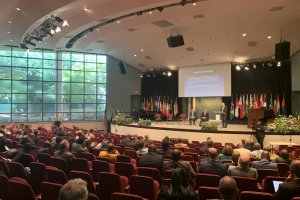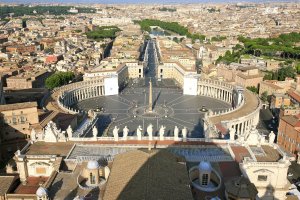
Pope Francis has urged the Organization for Security and Cooperation in Europe (OSCE) to continue making religious freedom a priority in keeping with the organization’s principles and responsibilities toward peace and security.
The pope’s message to the OSCE, the world’s largest regional security organization comprising 57 nations from Europe, North America and Central Asia, was conveyed January 13 by the Vatican Permanent Observer to OSCE, Monsignor Janusz Urbańczyk, at a special session of the group’s Permanent Council in Vienna, Austria.
The foreign minister of Poland, Zbigniew Rau, used the special session as a forum to inaugurate his country’s revolving chairmanship of OSCE as well as to delineate Poland’s priorities in its new assignment.
In a speech at the meeting, Urbańczyk conveyed the pope’s hope that “close attention will be devoted to the ever-growing intolerance and discrimination against Christians, Jews, Muslims and members of other religions.”
Such trends, Urbańczyk said, underline not just a violation of religious freedom but can trigger violence and conflicts on a wider scale, “thereby threatening the security and stability of the OSCE area and ultimately endangering peaceful relations among the participating States.”
Welcoming the humanistic perspective outlined by Rau, Urbańczyk said that such an approach would not only help focus proper attention to “all victims of violence, recognizing at the same time the specificity of intolerance and discrimination against members of religions,” but that it would also address “the specific needs of targeted religious communities.”
Urbańczyk also welcomed Poland’s commitment to focusing on the peaceful resolution of conflicts within OSCE member states by ensuring that “all voices are heard and all advice taken into account.”
Urbańczyk added that challenges can only be effectively addressed “through consensus … which requires a willingness to listen carefully and to take in due consideration the arguments of all participating States.”
The Vatican’s representative also stressed the need to stay clear from divisive issues that are not important to the OSCE’s vital aims of ensuring Europe’s peace and security.
Urbańczyk recalled the pontiff’s recent annual address to the diplomatic corps accredited to the Holy See, in which Francis expressed his concern that the efforts of many international organizations in dealing with present-day challenges are hampered “due to their members entertaining differing visions of the ends they wish to pursue.”
In his address, the pope observed that “the center of interest” in many international organizations “is often shifted to matters that by their divisive nature do not strictly belong to the aims of the organization,” and that consequently, “agendas are increasingly dictated by a mindset that rejects the natural foundations of humanity and the cultural roots that constitute the identity of many peoples.”
_______________
From its beginnings, the Church of Scientology has recognized that freedom of religion is a fundamental human right. In a world where conflicts are often traceable to intolerance of others’ religious beliefs and practices, the Church has, for more than 50 years, made the preservation of religious liberty an overriding concern.
The Church publishes this blog to help create a better understanding of the freedom of religion and belief and provide news on religious freedom and issues affecting this freedom around the world.
The Founder of the Scientology religion is L. Ron Hubbard and Mr. David Miscavige is the religion’s ecclesiastical leader.
For more information visit the Scientology website or Scientology Network.


